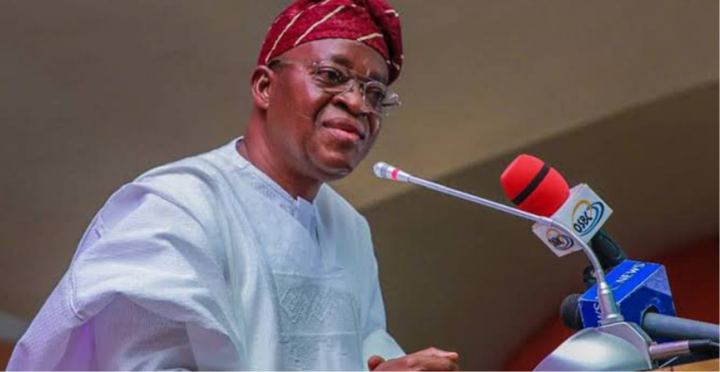The Federal Government has officially launched the procurement process for port modernisation projects outside Lagos, in a strategic effort to enhance efficiency, decongest the Lagos ports, and expand maritime infrastructure across Nigeria. The Minister of Marine and Blue Economy, Adegboyega Oyetola, made the disclosure during a stakeholders’ meeting in Abuja, emphasizing that the initiative forms a vital part of President Bola Ahmed Tinubu’s agenda to unlock the nation’s maritime potential and diversify revenue sources.
Oyetola explained that the move aims to create a more balanced and competitive port system across the country, reducing the heavy reliance on Lagos ports, which currently handle over 70% of Nigeria’s cargo traffic. According to him, the ministry has begun the procurement processes for modernising key ports in the Eastern and Northern corridors, including Warri, Calabar, Port Harcourt, and Onne.

He noted that these projects are designed to improve cargo handling capacity, enhance trade facilitation, and integrate smart port technologies that align with international best practices. “We have initiated procurement for port modernisation outside Lagos to ensure equitable development across the country’s maritime corridors. The era of concentrating all maritime activities in Lagos alone is over,” Oyetola said.
The minister stressed that the modernization plan is not limited to infrastructure expansion but also involves the introduction of digital systems, automated cargo processing, improved security frameworks, and the establishment of green port practices that support environmental sustainability. He added that the process would be transparent and open to reputable local and international investors with proven capacity to deliver on large-scale maritime projects.
“The ministry is committed to ensuring that procurement processes are transparent, fair, and in compliance with the Public Procurement Act. We are engaging with both public and private sector stakeholders to ensure that these projects deliver maximum economic value,” he assured.
Oyetola further revealed that the initiative would be carried out under a Public-Private Partnership (PPP) framework, which would attract significant foreign direct investment and ensure long-term sustainability. He said discussions with key global maritime development partners have already begun, with strong interest expressed by investors from Europe, Asia, and the Middle East.
The minister explained that decentralising port operations from Lagos would not only ease congestion and reduce turnaround time for vessels but also create thousands of direct and indirect jobs, particularly in port host communities. “The development of new and modernised ports outside Lagos will enhance trade, improve logistics efficiency, and stimulate industrial growth in other parts of the country,” he added.
Stakeholders in the maritime sector have welcomed the move, describing it as a long-overdue step toward achieving a more balanced port network and addressing the inefficiencies that have plagued Nigeria’s maritime industry for decades. The President of the Nigerian Chamber of Shipping, Mrs. Margaret Orakwusi, commended the government’s initiative, saying it will reposition Nigeria as a maritime hub in West and Central Africa.
“Port modernisation outside Lagos is a game changer. It will help decongest Apapa and Tin Can ports, reduce the cost of doing business, and attract more shipping traffic to other regions,” Orakwusi stated.
Similarly, the Managing Director of the Nigerian Ports Authority (NPA), Mohammed Bello-Koko, affirmed that the agency has begun technical assessments and environmental impact studies in preparation for the projects. He added that the authority is working closely with the Infrastructure Concession Regulatory Commission (ICRC) to ensure due process in the procurement and project delivery phases.
“The NPA is fully aligned with the minister’s vision for modern, efficient, and digitally driven ports. We are currently identifying key areas for infrastructure renewal, dredging, and automation to enhance competitiveness and service delivery,” Bello-Koko noted.
Industry experts, however, cautioned that for the initiative to succeed, the government must address existing bottlenecks such as poor access roads, inadequate rail connectivity, and bureaucratic bottlenecks in customs operations. They emphasized that infrastructure without efficient logistics chains and transparent port management could limit the impact of the modernization drive.
A maritime economist, Dr. Emeka Uche, pointed out that many ports outside Lagos have suffered neglect for years, leading to underutilization and poor performance. “Reviving these ports will require not just infrastructure investment but also policy reforms that make them competitive,” he said.
He suggested that the government should prioritize intermodal connectivity—linking the ports to railways and highways—to ensure seamless cargo evacuation and reduce dependence on road transport.
The port modernisation plan is also expected to stimulate regional development by opening up new economic corridors and attracting manufacturing industries closer to port areas. It will further strengthen Nigeria’s position in the African Continental Free Trade Area (AfCFTA) by improving trade efficiency and lowering logistics costs.
Oyetola reiterated that the ultimate goal of the modernization initiative is to transform Nigeria into a global maritime hub. “We are building ports that will not only meet today’s demand but also anticipate the needs of the future. Our goal is a maritime economy that drives growth, supports industrialization, and enhances Nigeria’s competitiveness globally,” he said.
The minister added that the first phase of the procurement process would be completed within the next few months, after which contract awards would follow based on merit and technical capability.
As the Federal Government intensifies its drive to modernise and decentralise port operations, expectations are high among maritime stakeholders that the long-awaited transformation of Nigeria’s port system may finally become a reality — ushering in a new era of efficiency, investment, and economic growth.
Support InfoStride News' Credible Journalism: Only credible journalism can guarantee a fair, accountable and transparent society, including democracy and government. It involves a lot of efforts and money. We need your support. Click here to Donate
